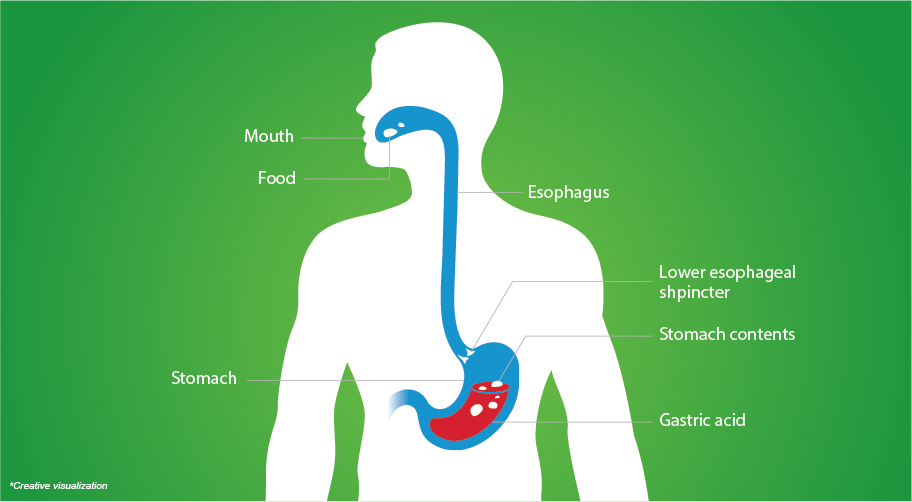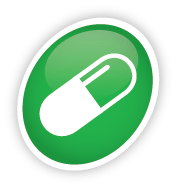Acidity problems affect up to 20% or more of adults on a regular basis.1,2 So even though you might think other people won’t understand what you’re going through, you’re not alone.
The most common problems associated with acidity are heartburn and acid reflux.1,2 Heartburn is that uncomfortable, burning feeling you have in the centre of your chest, especially after eating a large meal. Acid reflux occurs when you taste regurgitated food or sour, bitter liquid at the back of your mouth or throat.
Acidity symptoms can be very unpleasant and can strike at the most inconvenient of times, but they can usually be managed quickly and simply.1
What is acidity?
To understand what acidity is, let’s revisit what we learned in science class about the digestive system.
When we swallow food or drink, it travels down a ‘pipe’ – called the esophagus – to our stomach. The base of the esophagus, where it joins the stomach, has a band of muscle around it called a sphincter.1 This sphincter is closed tightly most of the time. It opens to allow food to enter the stomach, and then closes to stop the stomach contents from escaping.1
If the sphincter at the base of the esophagus is weakened or relaxes when it’s not meant to, gastric acid can rise up into the esophagus and it’s this acid that causes the uncomfortable symptom, heartburn.1

Causes and risks for acidity problems
While a weak or abnormally relaxed oesophageal sphincter is the main cause of heartburn, we don’t always know why it becomes weakened or relaxed.1
When we eat a large meal, our sphincter muscles could stretch or become weakened. Similarly, bending over or lying down may increase the pressure on the sphincter, causing it to relax.1
Other things seem to increase the risk of acidity problems without necessarily affecting the sphincter itself, so it’s a good idea to avoid them.

Do certain foods and drinks cause acidity?1,2
Yes, they do.
We all have the occasional craving for certain foods that aren’t very good for us. But it’s important to remember to take everything in moderation. Fatty or fried foods, spicy foods, onions and garlic, tomatoes and tomato products, citrus fruits and chocolate may trigger acidity problems or make them worse.
Just like with food, it’s important to be wise about our choice of beverage – especially after a meal. Alcohol, coffee, tea and other softdrinks or energy drinks that contain caffeine may also trigger acidity problems or make them worse.

Do our lifestyle choices cause acidity?1,2
Several of our lifestyle choices may be triggering heartburn.
Smoking may weaken the oesophageal sphincter. Besides being bad for our lungs, cigarettes bring about a host of other problems. This includes problems in the GI system.
Another factor that has a strong association with having acidity problems is being overweight. Losing weight doesn’t only have to be for aesthetic purposes. It could also improve your general health and wellbeing.
Also, many people find stress, or a lack of sleep can trigger their acidity symptoms or make them worse.

Do some medications cause acidity?1
If you take any medicine on a regular basis, such as some birth control pills or treatments for high blood pressure, it may contribute to acidity problems. You should discuss this with your doctor.
Acidity symptoms and problems
Most of us have experienced heartburn – that burning sensation in the chest – at some point in our lives. This is because it is the most common symptom of an acidity problem.1,2
Quite a lot of people suffer from heartburn at night, and around three out of every four of these people say it disrupts their sleep.3 Acidity problems at night may be related to lifestyle factors – you can learn more about that here.
Heartburn also commonly occurs during pregnancy. In fact, it is often seen as a completely normal part of being pregnant.4 Learn more about what you can do to manage heartburn during your pregnancy journey here.
If you experience severe or very frequent heartburn (2 or more times a week) and often have acid reflux, make an appointment with your doctor as this may indicate a more serious form of acidity, called gastro-esophageal reflux disease (GERD).1,5
Do acidity problems get worse with age?

Some people do not often experience acidity problems, while others may get them regularly. Sometimes you will go through a period with regular symptoms followed by a period without symptoms.1
People who do have symptoms regularly will probably continue to experience them on and off throughout their life, but on the positive side, the symptoms often won’t feel as bad.2
Solutions for acidity problems
Luckily, there are a few things you can do to get relief from acidity symptoms such as taking Eno, that works on the symptoms quickly. Eno complements your body’s natural self defence mechanism to fight heartburn, acid indigestion or sour stomach. Eno acts where the acid attacks and gets to work in just 6 seconds.7 Read more about Eno and learn how it can help relieve your symptoms here.2
There are 3 main types of medications used to manage acidity symptoms:2
Most antacids are available straight from your pharmacy, but you may need a prescription for H2RAs or PPIs.
Please see your doctor if your symptoms worry you, or if you try any of these treatments and they don't work or you find that you need them on a regular basis. You may need to have some tests done to confirm the problem or your doctor may give you a prescription for a stronger medication.
There are also some changes you can make to your everyday life that can help prevent or reduce the severity of acidity symptoms like heartburn:1,2,6
Where to find out more
It’s good to know that there are lots of things you can do to stop acidity symptoms from getting in the way of your everyday life.
One of the best places to start if your symptoms are not too severe is an antacid. One option could be Eno – you can find out about how Eno can help here.
Please remember to see your doctor if you have persistent or particularly severe symptoms.














